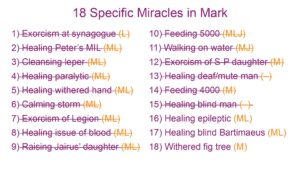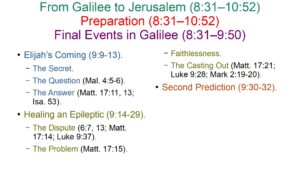Jesus from Galilee to Jerusalem
Mark 8:31–10:52
Preparation
First Prediction of Death and Resurrection (8:31).
The Kingdom is Near (1:15; 9:1)
Final Events in Galilee (8:31–9:50).
Call for Commitment (8:31–9:1).
Transfiguration (9:2-8).
Elijah’s Coming (9:9-13).
 Healing an Epileptic (9:14-29).
Healing an Epileptic (9:14-29).The dispute (9:14-18).
The problem (9:17-22a).
A father comes forward and begs Jesus for help.
The first thing he mentions is that his son has a “mute spirit.”
Then he describes what it does to his son when it seizes him.
In fact, when the boy is brought to Jesus he demonstrates right there just what the father said.
The boy says nothing, so it would appear this demon is also causing him to be both deaf and dumb as Jesus addressed the demon later (9:25).
There is nothing here for Jesus to rebuke in terms of a demonic confession as we recall most demons would try to make.
The symptoms described sound to many like epileptic seizures, which is one reason why he is often called “the epileptic.”
Matthew’s account refers to him as σεληνιάζεται (Matt. 17:15).
Literally, it is a verb form of the word for “moon,” as if one were “moonstruck.” Generally speaking, it was supposed such symptoms worsened as the moon became more full.
NKJV and a few others translate it as “epileptic,” while the KJV and a few others translate it as “lunatic.” The most common in the modern translations is “he has seizures” – which is evident from the description of the symptoms.
Apparently this was his condition since childhood. It is unclear how old the boy is now, but suffice it to say, he has suffered for several years with this condition.
On top of the seizures, the demon would intentionally harm the boy.
When Jesus is told that the disciples couldn’t cast the demon out, Jesus call this generation a faithless generation.
It’s clear He does not mean one completely devoid of faith, but it appears He is lamenting the fact that His disciples, despite all they have seen and done, were lacking in faith.
He wasn’t going to be with them long, holding their hand through all this. One day they would have to truly see as the blind man eventually saw (8:25).
Apparently it wasn’t only the disciples who lacked faith, but the father did as well.
It’s no surprise, especially after Jesus’ disciples failed to cast out the demon.
The father begs for compassion—little does he know who he is talking to.
The father says, “If You can,” as if there is a possibility that He cannot.
Other manuscripts read Jesus’ words here: “‘If You can!’ All things are possible to him who believes.”
I think this wording makes more sense than what we see here in the NKJV. This turns Jesus’ comments into one who is slightly incredulous: “Are you suggesting that I, the Son of God, cannot do something?”
Then He brings the discussion back around to faith, and the requirement of faith in such things.
Question: Are all things really possible to one who believes? Is Jesus literally saying everything we can think of is possible if we simply have enough faith or believe hard enough? If we believe hard enough, can we jump off the roof and expect to fly? No. No. No.
Jesus is using a figure of speech, emphasizing the power of God and of faith.
Jesus is informing them that, while His disciples were unable to do this, He can. He, as the Son of God, has the power to do the impossible.
As one preacher said: “Do not ever underestimate the power of faith … Don’t forget when you live your life, faith is very important. It is a great power that operates in your life.”
The father realized that he was lacking in faith. His son had been in this situation for so long, this was a last ditch effort to save his boy. Couple that with the disciples’ inability and his faith would naturally falter.
But he knew who to ask to help him with his faith—Jesus.
The casting out (9:25-29).
These goings-on appeared to attract a greater audience, so Jesus decided to quickly cast this demon out.
He commands the demon to leave and not to re-inhabit this boy any longer.
As before, the demon left the boy violently, perhaps more violently, since he was so still people thought he was dead.
Then He touched the healed boy, took his hand, just as He touched the leper and the girl who died, and the boy arose.
How relieved that father must feel right now!
Then they leave and privately ask Jesus why they couldn’t heal the boy.
What Jesus tells them no doubt excites demonologists everywhere.
First He hints that there are different kinds of demons.
Then states that some can only be cast out if the healer prays and fasts beforehand.
Again, other manuscripts leave out the “and fasting” part. Matthew is the only other one who records it, but in those same manuscripts, this whole verse is missing about prayer and fasting (Matt. 17:21).
In Matthew, Jesus answers that it was due to the disciples’ lack of faith, which fits with what Jesus said earlier, “O faithless generation …”
Did Jesus have time to pray and fast before casting out this demon? Sure, He may have prayed and we didn’t know it, but fasting takes a good deal more time.
Luke records that Jesus was praying on the Mount of Transfiguration (Luke 9:28).
So I don’t think He mentioned fasting here because I don’t think He would have had time for it. Plus, He did say much earlier that His disciples wouldn’t fast until after He left them (Mark 2:19-20).
But what relationship does prayer (and perhaps fasting) have with belief? Prayer helps to increase our faith, when we put all our cares on Him, knowing He can handle it in His own way on His own time. Both of these things can strengthen our reliance on Him, on His strength, power, and majesty.

